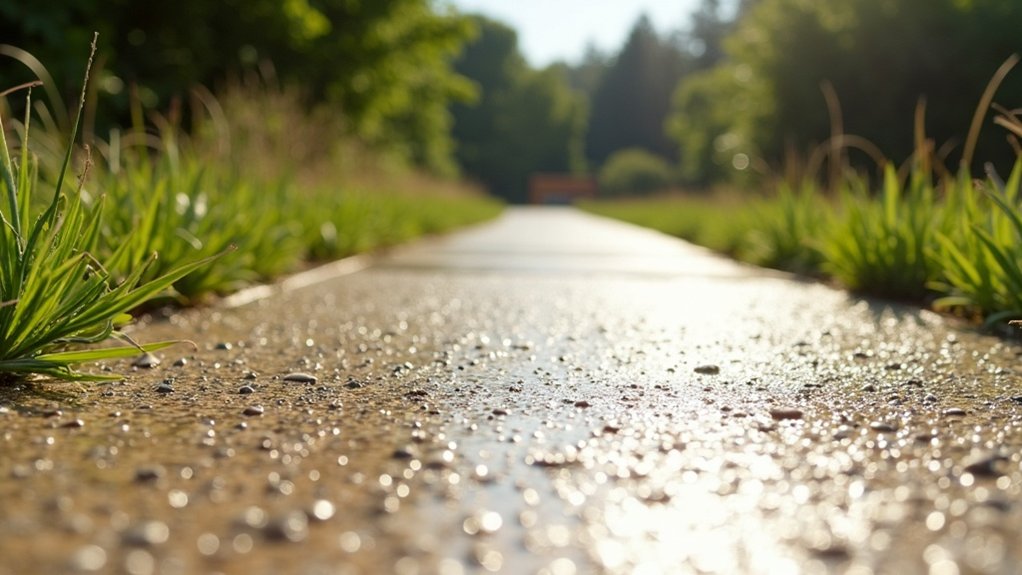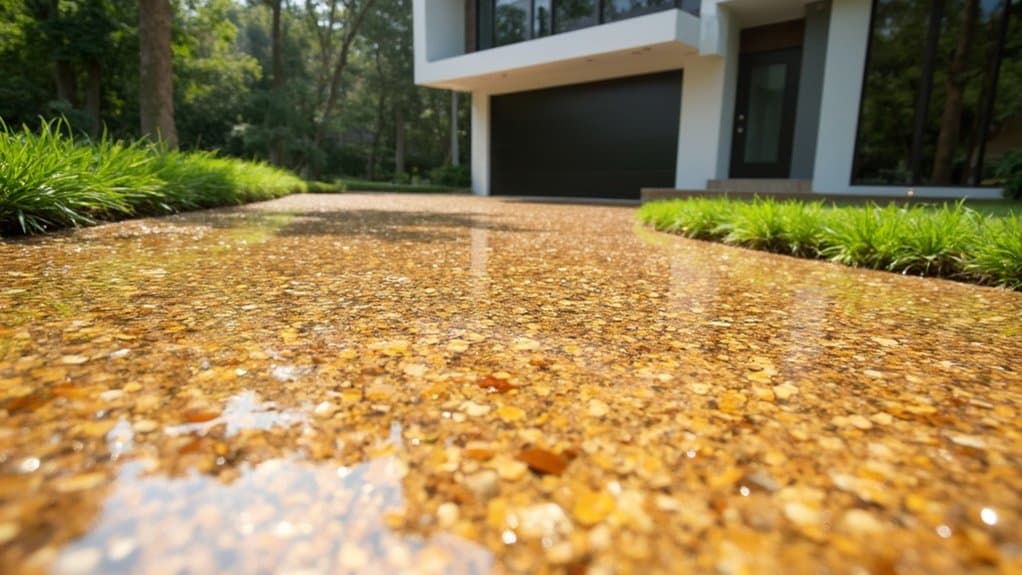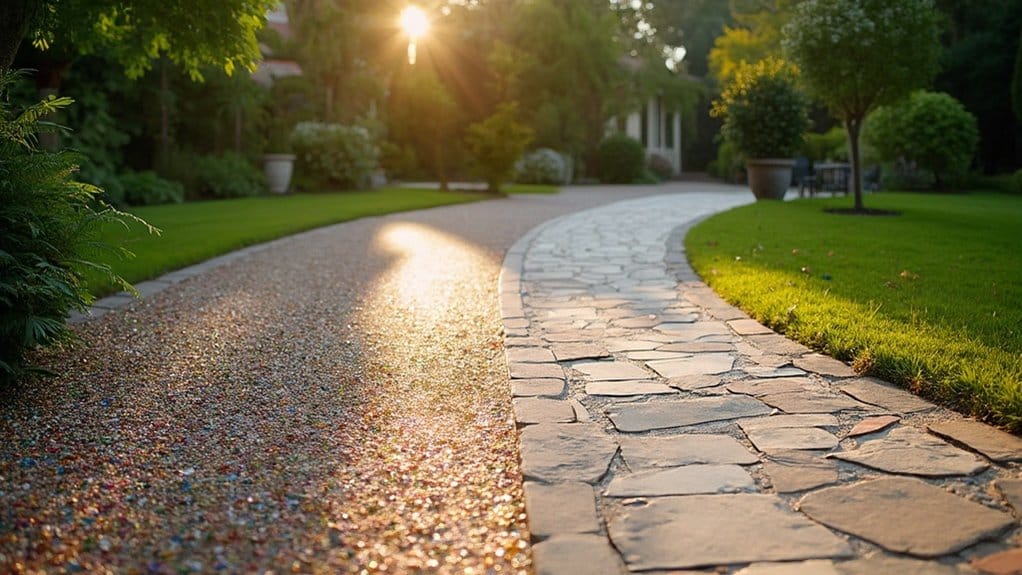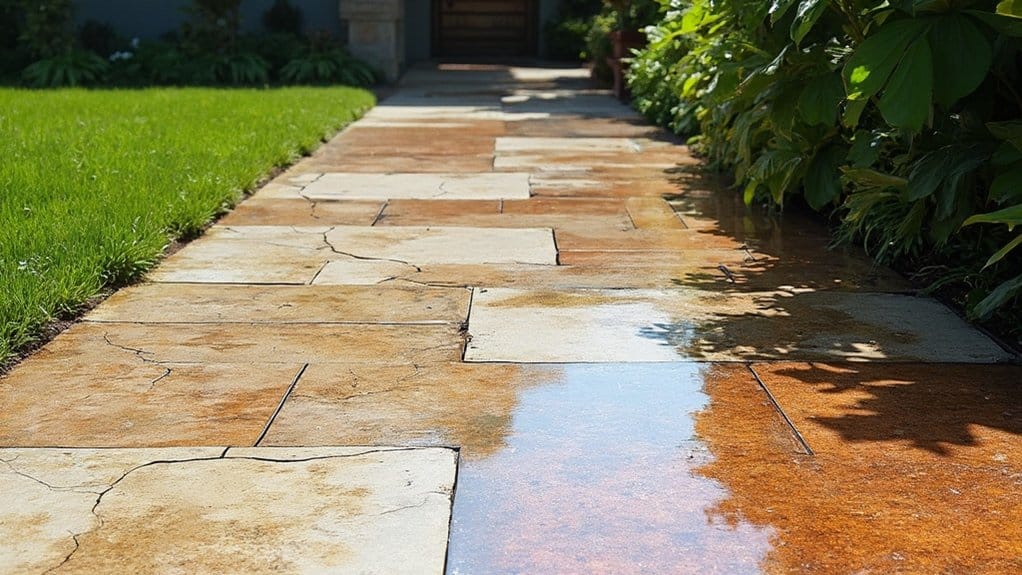Resin driveways offer a sustainable solution for urban areas. Their permeable design effectively manages stormwater, reducing the risk of runoff and flooding. By incorporating recycled materials, they help minimise resource extraction and promote ecological balance. With a lifespan of 15 to 25 years, resin driveways also reduce waste and maintenance efforts. Furthermore, their high albedo properties help to lower urban heat, benefiting local ecosystems. Read on to explore their advantages and environmental impact.
Table of Contents
ToggleKey Takeaways
- Resin-bound driveways are permeable, allowing rainwater to drain through and reducing surface runoff, which helps to prevent urban flooding.
- Incorporating at least 25% recycled materials in resin systems supports sustainability and conserves natural resources.
- With a lifespan of 15 to 25 years and minimal upkeep, resin driveways generate less waste and decrease the frequency of replacements.
- Sourcing aggregates locally cuts down on transportation emissions and bolsters local economies, thereby minimising the carbon footprint.
- Their reflective surfaces help reduce heat absorption, mitigating Urban Heat Island effects and lowering energy costs for cooling.
Permeability and Water Management Benefits

When looking for driveway options that effectively manage water, resin-bound driveways are a top choice due to their permeability. These driveways allow rainwater to seep through their porous surface, reducing surface runoff and helping to prevent flooding, especially in urban areas that experience heavy rainfall. Their smooth design minimises puddles, making them safer after storms. Moreover, resin-bound driveways meet Sustainable Drainage Systems (SUDs) standards, which enhances water management further. The right balance of aggregate and resin also ensures durability while allowing water to flow freely, making them highly resistant to water-related damage. Additionally, resin bound driveways can handle up to 850 liters per minute per square meter, showcasing their impressive drainage capabilities.
Material Sustainability and Composition
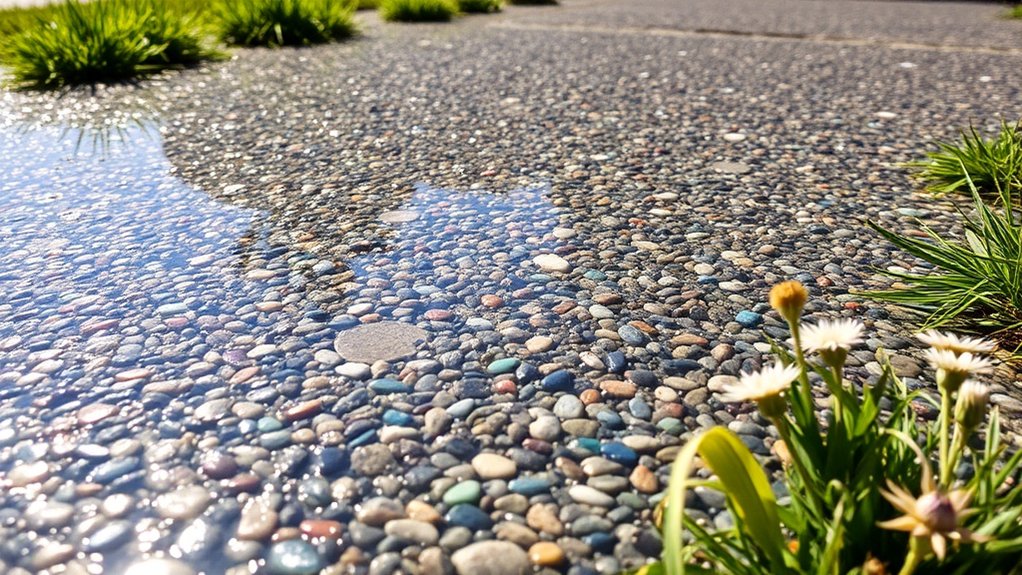
When assessing the sustainability of resin driveways, it’s important to look at the use of recycled aggregates and how materials are sourced. Using recycled components, such as crushed glass, can significantly lessen the need for new resources. Furthermore, considering the eco-friendly qualities of the polyurethane resin can help you understand its environmental impact and durability. Additionally, the permeable nature of resin driveways allows for efficient rainfall drainage, contributing to reduced flooding and waste over time. The incorporation of natural aggregates in resin driveways not only enhances their durability but also supports sustainable building practices.
Recycled Aggregate Usage
Using recycled aggregates in resin driveways promotes sustainability, but it’s important to know which types and sources are involved.
Common options include crushed glass, reused stones, and recycled concrete aggregate (RCA). Crushed glass not only provides a variety of colours but also enhances slip-resistance thanks to its texture. RCA is produced by crushing old concrete, which includes reclaimed mortar and natural aggregate. Many suppliers use at least 25% recycled content, ensuring durability in resin-bound systems. Additionally, the permeability of resin bound driveways allows for water drainage, making them an environmentally conscious choice. This feature contributes to effective drainage systems, which are essential for managing surface water runoff.
It’s crucial to properly wash and dry these aggregates to maintain quality. The typical resin-to-aggregate ratio of 7% to 93% supports porosity and durability, resulting in a long-lasting surface that effectively manages water drainage.
Sustainable Material Sourcing
Sourcing materials sustainably is crucial for the environmental impact of resin driveways. By prioritising local aggregates, suppliers can cut down on transportation emissions and reduce habitat disruption.
This not only lowers the carbon footprint from long-distance deliveries but also supports local economies, fostering sustainable supply chains. Using naturally abundant materials like gravel and quartz is another key aspect, as they typically require less environmental disturbance during extraction.
Furthermore, maximising the use of aggregates in resin mixtures ensures material efficiency and minimises waste. By adopting these sustainable practices, you can ensure your resin driveway is both attractive and environmentally responsible, benefiting local ecosystems and communities alike.
Eco-Friendly Resin Composition
When considering eco-friendly resin composition for driveways, it’s crucial to find the right balance between performance and sustainability. While many resins are predominantly petrochemical-based, there are options that incorporate eco-friendly resins and sustainable additives to improve their environmental impact. These materials create a strong bond with aggregates, resulting in a durable, permeable surface that supports Sustainable Urban Drainage Systems (SUDS). Here’s a quick overview of different resin types:
| Resin Type | Eco-Friendly Aspect | Performance Feature |
|---|---|---|
| Standard Resin | Limited sustainable additives | High durability |
| Eco-Friendly Resin | Made from bio-based materials | Enhanced permeability |
| Recycled Resin | Utilises post-consumer waste | Maintains structural integrity |
| Hybrid Resin | Combines eco-friendly and standard | Versatile application |
This composition ensures longevity while addressing environmental concerns.
Longevity and Reduced Waste
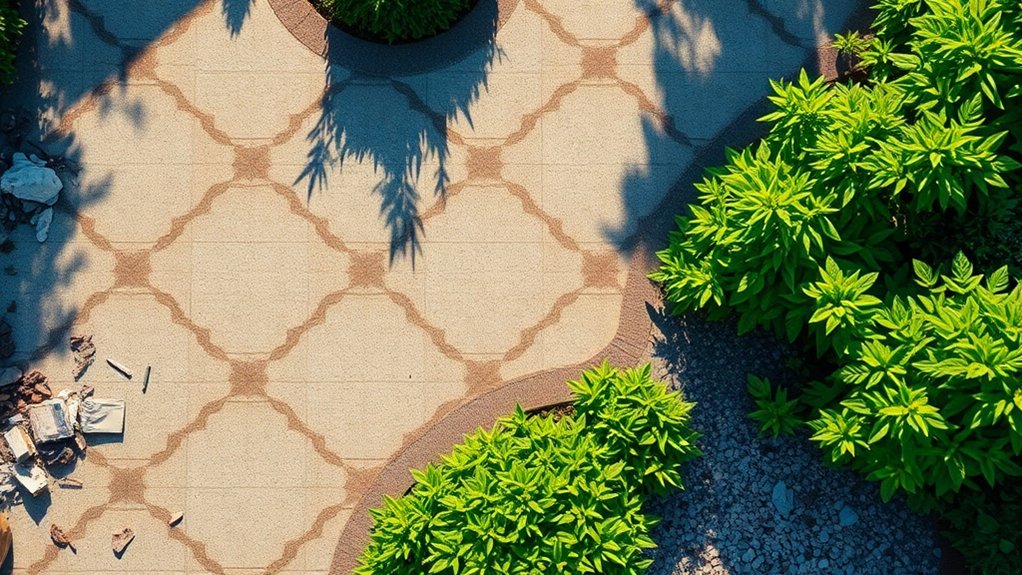
Choosing a resin driveway means investing in a surface that can last between 15 to 25 years with proper maintenance.
This durability reduces the need for frequent replacements, which in turn cuts down on construction waste significantly.
Plus, resin driveways require minimal upkeep, helping to preserve their quality over time and supporting a more sustainable approach to urban infrastructure.
Extended Lifespan Benefits
Resin driveways are a top choice for durability and longevity, typically lasting between 15 to 25 years with proper installation and care. This extended lifespan means fewer replacements, which is more sustainable as it reduces material waste.
High-quality resin and aggregates provide a strong surface that can withstand harsh weather and heavy use.
To ensure your driveway lasts, proper installation by skilled professionals is crucial, as it helps prevent premature wear. Additionally, resealing every 3 to 5 years can significantly enhance both its lifespan and appearance.
Minimal Maintenance Requirements
Maintaining a resin driveway is simple, allowing you to enjoy its visual appeal and practicality with minimal effort. Regular care ensures your driveway stays in excellent condition, prolonging its lifespan and reducing waste. Just a few hours each year for tasks like sweeping and pressure washing will suffice. Addressing stains promptly can prevent permanent discolouration, and you can easily manage weeds and moss manually. Additionally, resealing every 1-2 years helps protect against wear and tear. Here’s a quick overview of essential maintenance tasks:
| Task | Frequency | Purpose |
|---|---|---|
| Sweeping | Monthly | Removes debris, prevents stains |
| Pressure Washing | 1-2 times/year | Cleans ingrained dirt |
| Stain Removal | As needed | Prevents long-term discolouration |
| Resealing | Every 1-2 years | Protects and extends lifespan |
Waste Reduction Strategies
By prioritising longevity in resin driveways, you can significantly reduce waste over the surface’s lifespan. These driveways typically last between 15 to 25 years, far outlasting traditional materials like asphalt.
By using high-quality materials and precise installation techniques, you enhance durability and lessen the need for replacements. For example, opting for UV-stable resin and premium aggregates can help prevent costly failures that generate waste.
Additionally, implementing effective waste management strategies, such as using crack reduction membranes and monitoring for early signs of wear, allows for targeted repairs rather than complete replacements.
Regular maintenance, including resealing, also extends the lifespan, further reducing material use. Overall, these methods promote a more sustainable approach to driveway installation and maintenance.
Environmental Impact on Local Biodiversity
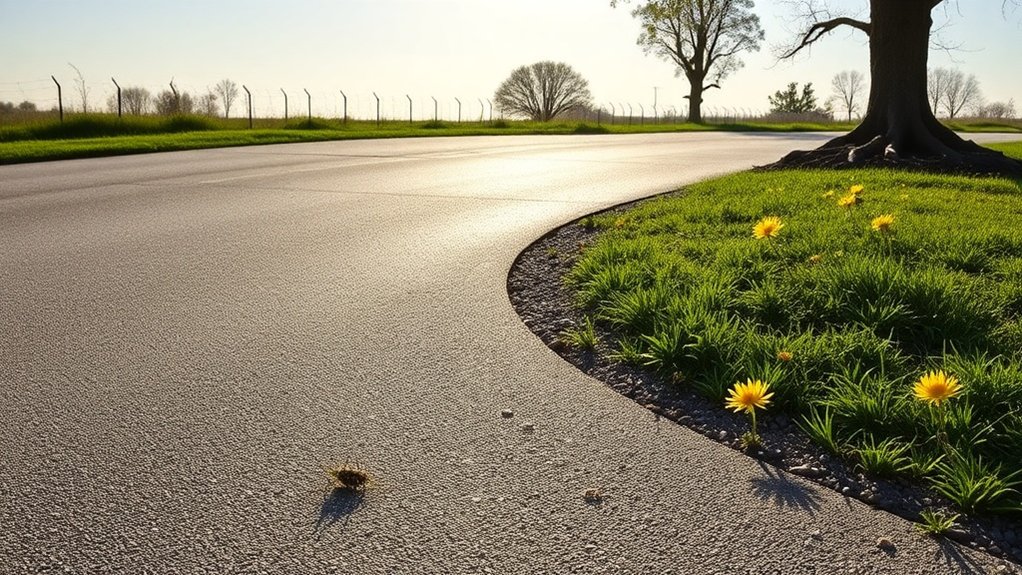
As urban development grows, the materials we choose for driveways significantly impact local ecosystems.
Permeable resin-bound driveways help preserve biodiversity by allowing rainwater to replenish groundwater, which is beneficial for both plants and wildlife. Their design follows Sustainable Drainage Systems (SuDS) principles, effectively managing water flow and reducing harmful surface runoff.
This controlled drainage aids in habitat restoration, maintaining vital ecosystems without disturbing existing plant life. Moreover, resin surfaces can blend seamlessly with the landscape, preserving habitats and supporting local pollinators.
Climate Adaptation and Urban Heat Island Mitigation
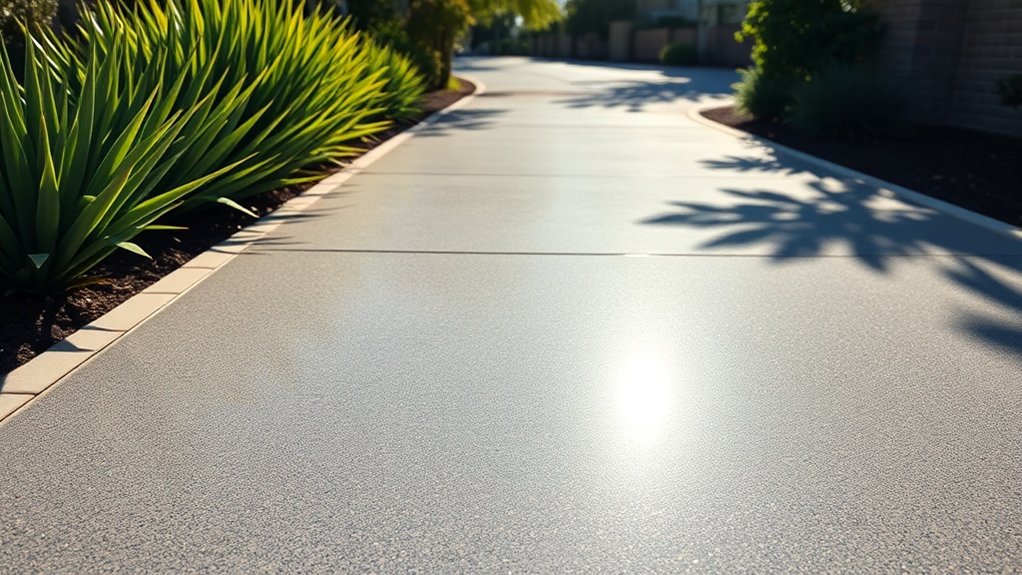
As urban areas face increasing temperatures due to climate change, resin driveways present a practical solution for climate adaptation and urban heat island (UHI) mitigation.
These driveways can be designed with high albedo surfaces that reflect sunlight, absorbing less heat compared to traditional materials. This is measured by the Solar Reflectance Index (SRI), which shows that resin driveways can effectively lower local UHI intensity and improve comfort for pedestrians.
By utilising urban cooling techniques, resin surfaces can decrease the reliance on air conditioning, leading to reduced energy consumption and lower emissions.
Moreover, their permeable nature aids in stormwater management and supports groundwater recharge, fitting well with strategies for climate resilience.
Installation Efficiency and Carbon Footprint
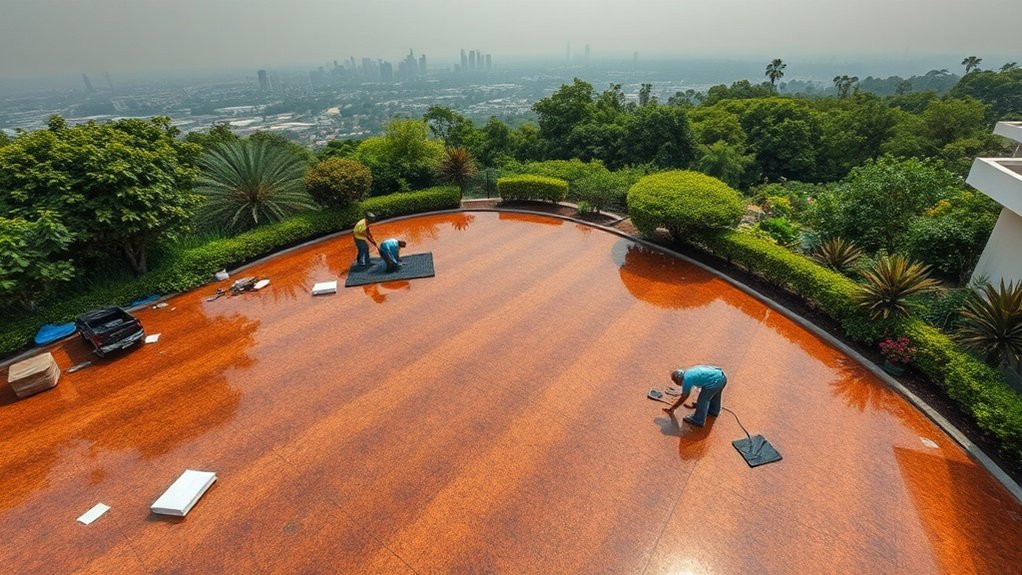
The efficient installation of resin driveways significantly affects their carbon footprint and overall environmental sustainability. By applying effective installation methods, you can reduce the time heavy machinery is used on-site, which in turn lowers emissions.
For example, ensuring proper ground preparation and a well-compacted sub-base is vital; inadequate preparation can lead to early cracking, resulting in increased resource usage over time. Additionally, improving efficiency during the mixing of resin and aggregates ensures a consistent blend, which is crucial for durability.
Using local aggregates cuts down on transportation emissions, and implementing effective drainage strategies helps prevent environmental damage. However, adverse weather can hinder efficiency, potentially lengthening installation times and increasing carbon footprints.
Therefore, careful planning and execution are essential for a sustainable resin driveway installation.
Enhancing Urban Aesthetics and Ecosystem Health
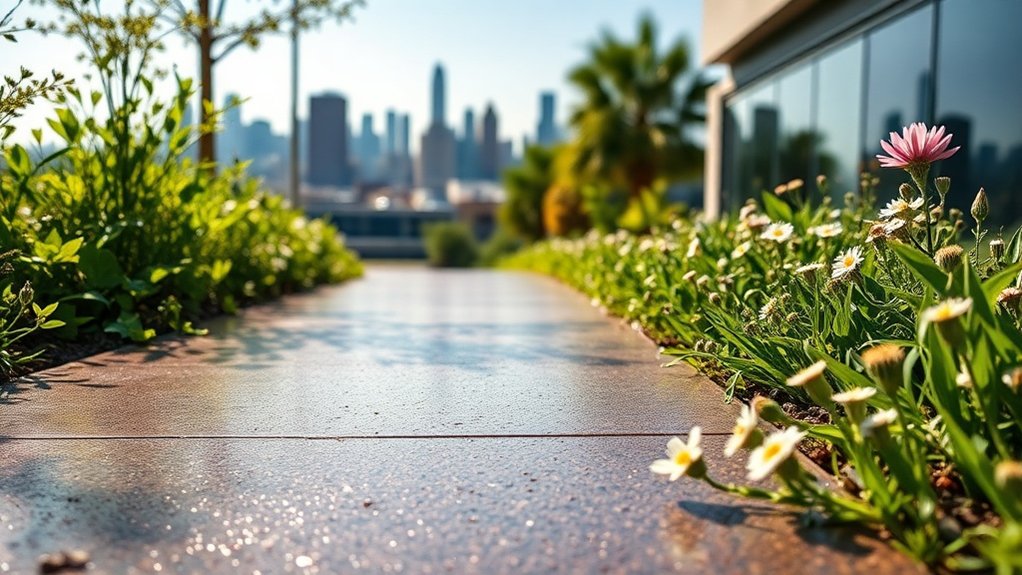
Resin driveways are crucial for enhancing urban aesthetics and supporting ecosystem health. They offer a practical combination of functionality and design flexibility to suit modern urban needs.
With a wide range of aggregate colours and patterns available, you can easily boost your home’s appeal while complementing various architectural styles. The smooth surfaces provide a polished finish that enhances overall urban design.
Moreover, resin driveways are permeable, allowing for effective water management. This helps recharge groundwater, reduces flood risks, and supports local ecosystems.
Frequently Asked Questions
How Do Resin Driveways Compare to Other Surfacing Options in Sustainability?
Resin driveways stand out in terms of sustainability when compared to other surfacing options. They help reduce water runoff, use recycled materials, and need less maintenance. This not only benefits the environment but also helps maintain your property’s value over time. For instance, unlike traditional tarmac, resin allows rainwater to permeate through, reducing flooding risks. Overall, resin is a practical choice for eco-conscious homeowners.
What Maintenance Practices Are Recommended for Resin Driveways?
Treat your resin driveway like a valuable asset. To keep it looking its best, sweep it monthly and wash it gently with a hose to remove dirt and debris. If you notice any stains, tackle them immediately to prevent lasting damage. Regular maintenance not only enhances its appearance but also ensures a safe surface for vehicles and pedestrians alike.
Can Resin Driveways Be Recycled at the End of Their Lifespan?
Yes, resin driveways can be recycled, but there are some sustainability challenges. Current recycling methods can reduce the quality of the material, making reuse difficult. To improve the sustainability of resin-bound surfaces at the end of their lifespan, we need advancements in recycling technologies and practices.
Are There Specific Environmental Certifications for Resin Driveway Products?
Yes, there are specific environmental certifications for resin driveway products in the UK, such as BBA certification and compliance with SuDS (Sustainable Drainage Systems) standards. These certifications ensure that the products meet environmental guidelines, supporting sustainability and ensuring quality in both installation and performance.
How Do Resin Driveways Affect Local Wildlife Interactions?
“Birds of a feather flock together.” Resin driveways can positively impact local wildlife by facilitating the movement of various species and maintaining natural habitats. They help retain moisture and minimise chemical runoff, contributing to a healthier ecosystem for urban wildlife. For instance, by creating a more permeable surface, resin driveways can support plants that attract insects, which in turn benefits birds and other animals.
Conclusion
In summary, resin driveways have benefits such as permeability and reduced waste, but their sustainability depends on several factors. It’s important to consider whether the materials used genuinely minimise environmental impact. When sourced responsibly, resin can be a suitable option. However, it’s crucial to assess the effects on local wildlife and the installation methods. Ultimately, balancing these considerations with the aesthetic and practical benefits will help you determine if resin driveways fit your sustainability objectives.
Learn about the benefits, types, and installation process of resin driveways, and discover why they might be the perfect choice Read more
Are you confused about resin-bound and resin-bonded driveways? Discover the key differences that could impact your property choice.
Just how beneficial are resin driveways? Discover the surprising pros and cons that could influence your decision before making an Read more

